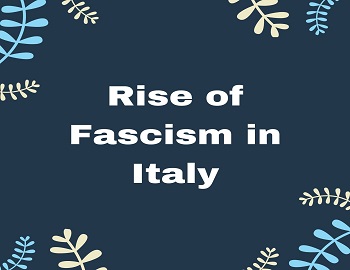Causes of the Rise of Fascism in Italy:
At the time of joining the First World War, Wilson had made it clear that the ultimate aim of the United States was to secure the democratic principles in the world. The Allies, which believed in democracy and liberalism, got success in the war. But the result of the first world war proved to be disastrous and hopeless in this field. The democratic governments of Italy and Germany failed utterly and they were replaced by dictatorship. An autocratic government was formed by Hitler in Germany and he established his Nazi dictatorship there. The same thing happened with Italy too. The liberal government fell there and a Fascist dictatorship was established under the leadership of Mussolini.
The main causes contributing to the rise of Fascist dictatorship in Italy were-
- Discontentment as a Result of the Treaty of Versailles- Prior to First World War Italy was in the camp of Germany and Austria. Contrary to this she joined Allies in the First World War against the Central powers as she was promised monetary rewards and territorial expansion after the war. But the Treaty of Versailles disillusioned her aspirations. During the Paris Peace Conference, her hopes were levelled down. She got much less than she had expected to get out of the spoils of the war due to American President Wilson’s opposition. The Italians felt neglected and cheated. Even their genuine demands were not accepted. This gave a shock to Italy’s imperialist designs. This brought Italy into the hold and folds of fascism.
- Economic Crisis- A vast number of Italians were either killed or wounded in the war. The people in large number were rendered homeless. This increased the national debt tremendously. There was a great scarcity of food grains in the country. The prices of the commodities of daily use rose to the sky. Trade and industry were ruined. Unemployment was on the increase. The condition of the middle-class people worsened. Italy faced an acute economic crisis after the war. Many riots took place in Italy. The social unrest and discontentment led to the rise of fascism in Italy.
- Propagation of Communism- It will not be an exaggeration to say that an extensive propagation of communism was responsible for the success of Mussolini’s Fascist Party. The people had grown apprehensive of the growing influence of communism. Ketelby writes that the early Fascism of Italy was a reaction to communism. It put a halt to the growing influence of communism. But Fascism was something more than this. After World War, the atmosphere in Italy was filled with discontent and despondency. The rise of Marxism and unionism in such an atmosphere produced a violent nationalism among the peasants and workers, so communism began to thrive in Italy. The Italian communists began to dream of establishing the government of the proletariat in Italy by exciting the peasants and workers to revolt as the Bolsheviks had done in Russia. Socialist parties of several hues appeared in the country. In the elections held in November 1919, the socialist secured 156 seats, but Italy did not turn red because the Fascist Party vehemently opposed communism.
- Inefficient Government- The Treaty of Versailles and the economic crisis spread a wave of anger and unrest in the whole of Italy. The Liberal Government of Italy was weak and inefficient. It did not rise to the occasion. It could not maintain law and order in the country. Hence the people craved for a change. They found in Mussolini their saviour who could rescue the nation from the acute crisis. Thus Fascism grew and thrived in Italy. ‘Bold leadership was the need of the hour and it was supplied by the Fascists’.
- Disunity among the Opposition Parties- At that time, there were many political parties in Italy. But they were not united among themselves. Almost all parties got some seats in the Parliament due to the proportionate system of election. No party could be capable of forming an independent government on its own. So, they mostly formed the ministries with the cooperation of each other. Consequently, they could not solve the problems of the country properly and wasted their time in making efforts for capturing power into their hands. Thus, there was a lack of unity among themselves. The Fascist party took the advantage of their disunity and propagated its principles among the people.
- Contribution of Mussolini in Rise of Fascism in Italy- According to most of the scholars, much credit for the spread of Fascism in Italy also goes to Mussolini who made the best use of the confusion caused by the economic crisis as well as by some political parties (especially by the Communists and the Socialists). He organized armed gangs against the Communists and the Socialists in 1919 A.D. On 28th October 1922 A.D., he along with his volunteers and supporters attacked Rome (i.e., the Capital of Italy) and compelled the liberal Prime Minister of Italy (named Giolitti) to resign. The king of Italy- Victor Emmanual III invited Mussolini to join his government and soon he was made the Prime Minister. Now Mussolini was all in all in Italy. In 1926 A.D. he banned all the political parties except his own Fascist party. He suppressed his main political rivals i.e. the communists and the socialists. He followed the policy of war and expansion.









Comments (No)